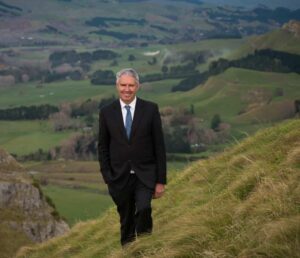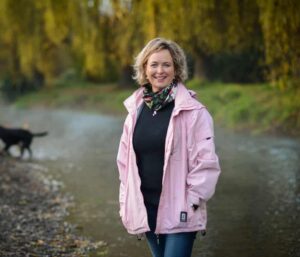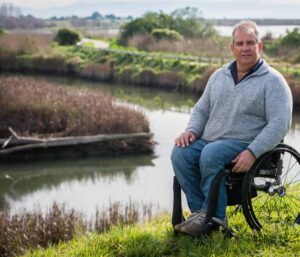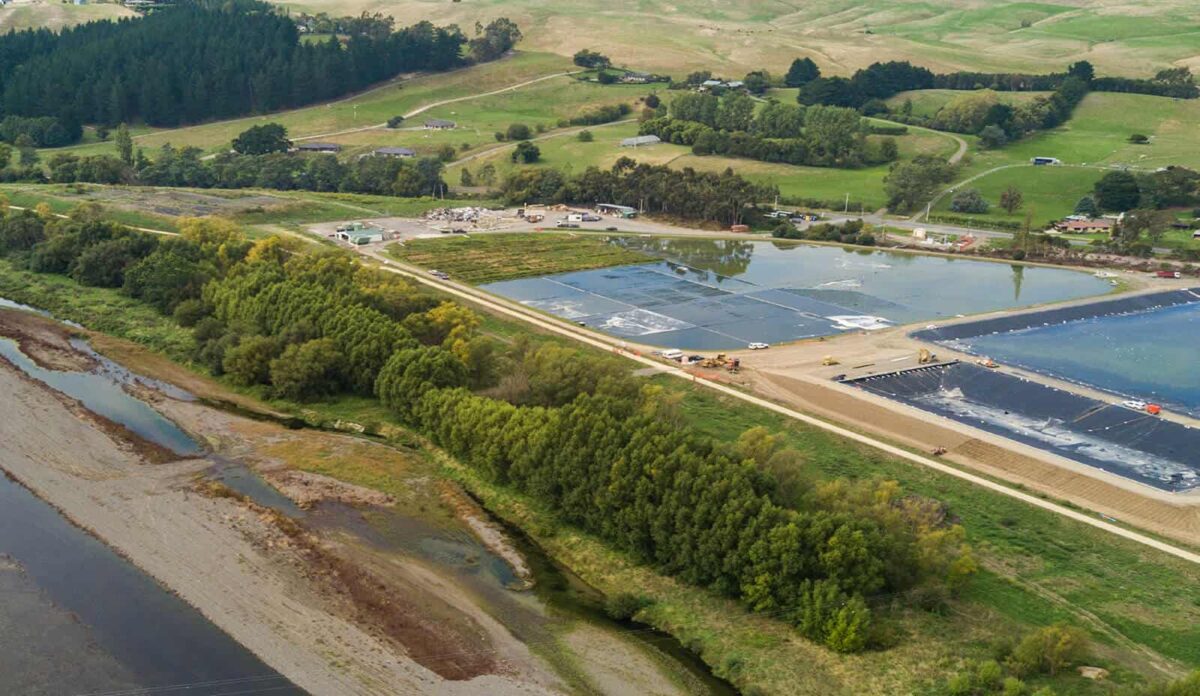LABOUR’S ENVIRONMENT SPOKEPERSON David Parker has been outspoken on water issues, calling for swimmable rivers, fewer dairy cows, less nitrogen in our waterways, requiring consents for intensified farming, and tougher enforcement of rules by both regional councils (whose e effectiveness in this regard would be overseen by the Audit Office) and directly by EPA. But a visit to the Labour website contains but two ‘motherhood and apple pie’ sentences related to environmental issues, with no supporting detail.
National’s website is totally silent on the environment; however, the government has begun the usual election year tradition of sprinkling dollars designed to look like it cares … most recently funding a project to recycle tyres. That $19 million proposal was immediately trashed by recycling experts like the Product Stewardship Council as ignoring best practice and simply providing a taxpayer subsidy to tyre manufacturers. But expect more dollops like this in the months ahead.
As you would expect, the Green Party overflows with environmental policies, perhaps the most provocative of these being a carbon tax and a ‘Taonga Levy’ – the latter a $14 to $18 increase on existing border charges for international visitors – to finance protection of the natural endowment our many visitors put pressure on.
The relative neglect by the two major parties was illustrated further when BayBuzz interviewed Tukituki candidates Lawrence Yule and Anna Lorck. Lacking comprehensive environmental policies ‘from above’, Lorck and Yule were left scrambling, rather than speaking out on issues affecting the Tukituki electorate. Perley contrasted the major party candidates by showing a good grasp on the environmental temperament here in the Bay.
[Giving the candidiates a ‘second chance’, BayBuzz invited the candidates to submit brief statements on the environment, which are published verbatim at the end of this article.]
In their interviews, the candidates were vocal about one issue – the dominant issue that has aggravated and energised the Tukituki electorate for the past twelve months …water. Dirty, swimmable, bottled, dammed, drinkable water.
Water focus
“The biggest environmental issue facing us is understanding the balance of water use on the Heretaunga Plains,” says Yule. “How much is available for safe high-quality drinking water, how much is available for industry, how much is available for the irrigation sector, and then how much is available for water bottling, which is something that concerns just about everybody. They are worried about it.”
Yule says first the community has got to make sure this resource is looked after in a sustainable manner. “When the whole economic hub of this region is based on what’s underneath where we sit today we need to be really sure we understand it and to allocate it clearly in a sustainable way.” While he would like to address other environmental hot spots such as the Tukituki River, he says potable water is the priority.
The relative neglect by the two major parties was illustrated further when BayBuzz interviewed Tukituki candidates Lawrence Yule and Anna Lorck. Lacking comprehensive environmental policies ‘from above’, Lorck and Yule were left scrambling, rather than speaking out on issues affecting the Tukituki electorate
While Lorck agrees with Yule on the priority of water, the Labour hopeful asserts that if it wasn’t for the contamination crisis in Havelock North – a traditional National stronghold – fresh water wouldn’t even be on the agenda this election.
She believes the Bay is in the best position of anywhere in the country to lead on fresh water quality and safe drinking standards and says Labour is prepared to make the tough decisions to make this happen.“My interest, passion and commitment to water is overflowing now,” she says. “So if change is going to happen it has to happen here first.”
Perley says the water issue goes beyond what is merely potable, saying this resource is important because it is the “prime indicator” of what is happening in the rest of the ecosystem. He views last year’s campylobacter outbreak as a wakeup call not only for drinkable water, but for other water-related issues, such as biodiversity in the feeder systems.
“The biggest focus is water and water quality and what is happening with our rivers and streams … and the cause isn’t just intensive land use like dairying, it’s also things that happen within our cities,” he says. “Good quality water within a sponge landscape that is resilient to drought and resilient to flood and is good for biodiversity. It all goes together and is good for the economy. So water is pretty much the focus.”
What to do
So if water is the biggest issue, how do the candidates address it?
Yule’s view is simple. “For 150 years we have been denuding the land of forest, we have been intensifying production on farm land, we have been importing fertiliser to make stuff grow more, and actually I think we have gone too far. Addressing some of that stuff is going to take time and it is going to take money and it is going to take a concerted effort.”
He argues that while water quality in the Bay and the country has deteriorated over decades, his party realises this and understands that some things, such as investment and land use, must now be done differently.
“The biggest environmental issue facing us is understanding the balance of water use on the Heretaunga Plains” LAWRENCE YULE

The National Party candidate says while the environmental lobby may not see this approach as fast or aggressive enough, a balance needs to be sought as the damage that has been done to the waterways goes beyond agricultural practices.
“What I see in environmental policy is a whole lot of criticism in farming practices,” he says. “Yes there can be room for improvement, but actually I don’t think that it is fair to blame the farmers for everything when we haven’t even started to address the urban water issues – from stormwater, from brake and tyre run off on our roads, from sewage and other things getting into estuaries.”
“Every New Zealander has got a part to play in fixing this and…the National Government is committed to readdressing this balance.”
Perley emphasises the need to refocus on how land is used. “If you want to solve these problems with our aquifer and our streams then you have to go back to land use,” he says. “At the moment, we don’t encourage an integrated patchwork of woodland and pasture and high quality produce and happy cows.”
For Lorck it’s about better regulation. Noting that Kiwis are not pro-regulation, she believes rules are going to have to be tougher if any change is to be made. “We are saying we will regulate, we are going to get tougher on our regional councils,” she says. “Just because you were allowed to pollute rivers last year doesn’t mean you can pollute them next year and if it takes that kind of regulatory action then that is something that we are prepared to do.”
In doing this, she says Labour will put more pressure on the regional councils to “do their job”. Locally, Lorck says the Hawke’s Bay Regional Council has had the rules in place to be able to regulate and be tougher, but “we are yet to see some of those enforced”.
“If we need to get in with a stick we will,” she says. “I don’t think we will see that level of toughness from National.”
The dam
Of course the dam still looms as a contentious issue for Bay voters.
The National Government has made no secret that it is pro-irrigation, setting aside $400 million for direct capital investment into large-scale irrigation schemes, with about $100 million presently slated for the RWSS.
Yule believes one way or another water storage needs to happen, that it is not tenable to go out into the next 20-30 years saying “water storage is too hard”. His Facebook page and campaign ads in the CHB Mail tout his support for the Ruataniwha dam. “My point is the issue is not going to go away we are going to get more droughts, we are going to compromise our production and water storage,” he says.
There’s no sign of a position on the dam on candidate Lorck’s website or Facebook page. In conversation, she puts the fate of the project in regional councillors’ hands, indicating that if the project cannot meet the conditions HBRC has set out, the dam should not proceed and other water storage options should be explored.
Alongside his party, Perley has steadfastly opposed the dam, and labels the government’s $400m investment “visionless”, saying dams and irrigation encourage intensification, whereupon the economic model becomes one of environmental degradation instead of environmental enhancement, of extraction rather than creation, of quantity over quality.
“The Ruataniwha dam would be an economic and environmental disaster,” said Green Party water spokesperson Catherine Delahunty last year. “At present, all funding to build the dam is coming from the public purse, while the benefits of it will go to private users. Hawke’s Bay Regional Council should call the project off , or risk ending up with a white elephant water scheme that the public foots the bill for. This irrigation scheme will only make the water more polluted; most of the rivers in the Ruataniwha catchment are already polluted and exceed acceptable nitrate levels.”
Says Perley, “If they want to put investment in, why not put $400 million of investment into high-value batch processed, uniquely marketed and labelled New Zealand products so you can hold price first?”
“Until [politicians] ‘get’ that land enhancement and water enhancement relates to economic enhancement, we will just keep seeing the problems, we will just keep seeing the ‘Fonterra’ model.”
Beyond water
Water is not the only environmental issue for New Zealand. From the Resource Management Act’s new ‘360D’ clause to oil and gas development to biodiversity to fisheries protection the list is long.
The RMA’s provision ‘360D’ has been a clause of contention. Labelled the ‘dictator clause’, it gives the Environment minister the power to override decisions made at a local government level.
At the heart of this debate was the vocal GM Free lobby, who successfully got the Maori Party to bargain with the government so our pastures and fields can remain free of anything genetically engineered.
As Hastings mayor, Yule was a part of that lobby – his council one of the first local bodies to declare its district GM free. He believes that the changes made to the RMA clause are a pragmatic balance. “We have got what our district has wanted … our ability to remain GM free [will] not be overridden by the ‘360D’ clause,” he says, noting that any medical uses of GM will be unaffected.
“I am proud of the fact that this district has said what we wanted, we have managed to articulate that.”
However, at the same time, his party – and especially its environment minister, Nick Smith – remains adamantly opposed to regional regulation of GMOs. And as noted in a previous BayBuzz interview, all Yule can do if elected is toe the party line.

“When it comes to local communities being able to make decisions that impact on their environment and their economy, then I believe we should have that right to make those decisions.” ANNA LORCK
Lorck, whose public relations company ran the GM Free campaign, says changes made to the clause have not gone far enough. “When it comes to local communities being able to make decisions that impact on their environment and their economy, then I believe we should have that right to make those decisions,” she says. Her position seems at odds with Labour’s environment spokesperson David Parker, who has said: “It’s wrong that councils should control whether you have a release for a GMO.”
Environment vs economy
While he views economic success as a cornerstone of National’s appeal, Yule says it is not “an either/or”, when it comes to the economy or the environment.
“I don’t think they are doing it in any direct attempt to try and compromise the environment, I think they realise that actually some environmental things have gotten worse and we need to fix them,” he says. “It may not be expressed in a straight policy sense as yet, but a smart political party needs to understand that these are important to New Zealand and I think the National Government does that.”
He notes that when people cannot afford to put food on the table, value issues such as the environment are not as important to them; it is because of National’s sound fiscal management that government has the luxury of now being able to address such matters.
Perley disputes this saying that for the National Party it is indeed an “either/or”; that they see resources as things for free and to take and then pollute because “we are allowed to”.
“That in order to have a strong economy you have got to screw your people and screw the land and that’s their vision,” says Perley.
He argues that New Zealand can have a better environment as well as a better positioned economy.
“You don’t just sort out climate change and water quality, you also go into a better-quality presentation for your products so you end up with a high-value, diverse business model. Right now, we are moving very much the other way.”
He says for proof of this one only has to look at the crisis that started the rallying cry for clean water – the Havelock North campylobacter outbreak. A mismanaged environment led to people getting sick, which led to the village feeling the economic effects of it still today. “The links are so strong, and that is what I don’t think the National Party gets at all,” he says.
Lorck says that when in government her party has taken a far stronger line on environmental policies than National.
“We are in a good position to move on those things,” she says, noting that any sort of long term change must come from today’s youth. “It is up to the government of the day to actually start listening to the young people and empowering the younger people to have their voice.”
Lorck asserts, “You can bet anything that a Labour-led government will put a lot more focus on the environment than National has in the last nine years.”
Candidate Statements
ANNA LORCK – LABOUR PARTY
We are taking fresh action to ensure that our rivers and lakes are genuinely swimmable, without trickery. We will set standards and enforce them.
We will require all rivers and lakes to be clean enough for people to swim in during summer without getting sick, while achieving aquatic ecosystem health.
Increases in the intensity of land use for livestock will no longer be a permitted activity. This point of control will be used to stop rivers and lakes getting dirtier, without delay.
Within five years water quality should be improving. Even the most grossly polluted rivers and lakes must be cleaned up over a generation. This will also protect aquifers.
All intensively stocked land near waterways will require fencing within five years with setbacks for riparian planting to filter and absorb silt and nutrients.
We will fund either the Ministry for the Environment or the Environmental Protection Authority to enforce the law by prosecuting breaches of the Resource Management Act through local Crown solicitors, including the right to reclaim costs from the guilty party and the regional council.
Labour has actively supported Hawke’s Bay’s right to protect the GM Free growing status and we strongly opposed National’s 360D clause to override local decision-making powers to protect the region’s environment.
We will be releasing more environment policy closer to the election.
CHRIS PERLEY – GREEN PARTY
The Green Party believes that people are a part of our environment. You cannot separate us. Without a healthy environment, we can have neither healthy communities nor healthy local economies.
The environment is not something you “fix after you get the economy right”. It provides for community wellbeing. It provides economic diversity as well as the quality, safe and healthy produce desired by discerning markets, who will pay for it.
Our polluting, low quality model is dumb economics, and shifting away from that increasingly industrial, third-world commodity model is part of the Party’s integrated environmental, social and economic vision.

“The biggest focus is water and water quality and what is happening with our rivers and streams … and the cause isn’t just intensive land use like dairying, it’s also things that happen within our cities.” CHRIS PERLEY
It is the reason for our opposition to GMO food, the Ruataniwha dam, intensive farming and oil and gas putting our rivers and aquifers at risk for the short term gain of a few.
Healthy homes, renewable energy and rethinking our transport systems away from motorways and fossil fuel vehicles link future resilience to climate change and fossil fuel limits with building communities and smart enterprise.
Our carbon tax both discourages greenhouse gases and encourages the development of a richer carbon landscape with healthier soils and increased woody and wetland habitat … which in turn reduces more energy use, increases biodiversity, improves water quality and reduces flood and drought risk.
Our biggest focus over many years is water quality. The Tukituki is one of the Green Party’s 10 priority rivers based on iconic environmental and community values. There is no better indicator of the health of the land, community and economy.
LAWRENCE YULE – NATIONAL PARTY
Many people know I am a strong supporter of the environment. I too want people to be able to swim in rivers like I did as a child. The environment and climate are two areas I want to focus on if elected to Parliament.
The National Party has a strong environmental commitment and has resulted in environmental policy becoming a central plank of National Strategy for New Zealand’s success.
National has also made significant policy and investment decisions to support the environment including:
Climate change: A commitment to a 30% reduction in greenhouse gases by 2030. New Zealand is on track to have 90% renewable energy by 2025.
Predator Free 2050: An commitment to eliminate all possums, rats and stoats by 2050 to support New Zealand’s internationally recognised biodiversity.
Water quality: 90% of all rivers will be swimmable by 2040. This is the first direct head-on attempt to improve water quality by imposing ambitious improvement targets. This is being supported by a $2billion clean-up fund. Water quality improvement is everyone’s responsibility, including farmers and urban dwellers.
Air Quality: The PM10 Standards are responsible for dramatic improvements in air quality. This has led to a change in fireplaces, bans on open burning during winter months and a major insulation package.
Tyres: A National Environment Standard on tyres. This is supported by a new national tyre collection system, tyre shredding facilities and the ultra high temperature clean burning of the shredded tyres to help produce cement in the Nelson.

